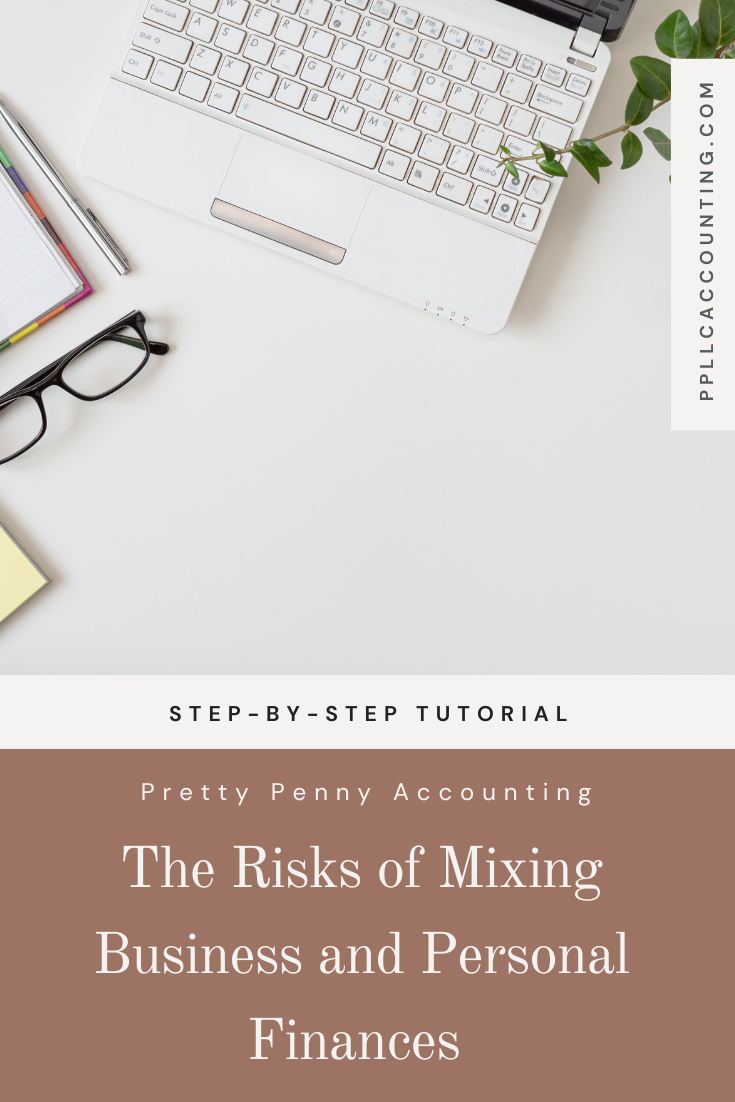The Risks Of Mixing Business And Personal Finances
- Ashley

- Oct 3, 2022
- 3 min read
Updated: Mar 22, 2023
One of the first steps of starting your own business is opening a business checking account... Emphasis on the word "business." When you own a business, it's easy to consider the assets of the business to be your assets. While this is true to some extent, it can lead to issues if you start treating the business's money as your own, using business accounts for personal purchases and vice versa. This is known as commingling funds, and it can expose you and your business to serious financial risks. Let's take a look at some of the risks of mixing the two...
Business vs. Personal Expenses

According to the IRS, a business expense must be both "ordinary and necessary" but what does that mean exactly?
An ordinary expense would be your rent or utilities at your office space or building where you operate. A necessary expense would be something more specific to your line of business. For example, if you own a bakery, a necessary expense would be flour, sugar, or maybe even machinery like an oven or a mixer. All of these expenses are considered write-offs. A brand new Apple Watch or the Dyson Airwrap might seem like a necessity to present yourself at work, but ultimately these would fall under personal expenses and could not be written off. Sometimes lines can get blurry when deciding what is business and personal but before you swipe that business card, ask yourself "does this pertain to my business?"
The Risks
Legal Issues
If you run into a very unfortunate situation where your business was sued, your lawyers would have a difficult time presenting your case with a money trail and documents. Whoever is suing you, on the other hand, will have a stronger case if they have evidence of blended finances. This could expose your personal expenses to the court. Who is to say how much money you have and what it's for if your business finances are mixed in with your personal finances? By combining two very different aspects of your life in one location could potentially run the risk of putting your home on the line even if it's separate from your business.
Disorganization
When you transfer money between accounts frequently, it becomes difficult to keep track of transactions, resulting in an unpleasant mess of unorganized data. You won't know your business expenses at a moment's notice, and it's becoming increasingly difficult to calculate the money spent on keeping your business running smoothly.
Miscalculations in Taxes
When all of your finances are combined and disorganized, you run the risk of miscalculating your taxes. Tax season is stressful enough so when it comes time to calculate your annual income and expenses, the last thing you want to do is spend time separating business and personal expenses. Keeping your business expenses separate will save you a significant amount of time and hassle when it comes time to file taxes.
Increasing Your Chances of an Audit
You may be thinking "this could never happen to me" but mixing your finances can definitely trigger an audit. If you're chosen for an audit and all of your finances are jumbled together, the auditor will probably dig a lot deeper than they would otherwise, making the audit process longer and causing even more stress. Remember those write-offs I mentioned earlier? You could also run the risk of missing out on some deductions if you can't prove what's what
Business Growth
As your business grows, you may come across investors who want to buy stock, advertise your product or services, or maybe help promote your business. Combining your business and personal accounts is an unprofessional move that can cost you many great opportunities for growth. Some of these new business ventures might require you to share information about your current cash flow, exposing your businesses bank statements or other sensitive financial reports. If they see any evidence of sloppy spending, they may think twice about doing business with you.
The Solution
The solution to mixing business expenses with personal expenses is pretty straightforward: just don't do it. Doing it once or twice could lead to doing it several times and could create a bad habit and even bigger headache down the road. Make sure you have separate business and personal accounts, as well as separate credit cards. Use business accounts for all business purchases and personal accounts for all personal purchases. If you need to buy something for your business but only have your personal card on hand, consult with your bookkeeper (hey, that's us) to properly record the expense. Keeping these finances separate will only benefit you in the end...
Want more tips like these? Sign up for our Newsletter and don't forget to give us a follow on our IG! @prettypennyaccounting
Related Posts
See AllYour past clients are more than just a line in your bookkeeping—they’re one of your greatest business assets. They already know your...
Summer can be a strange season for small business finances. For some, it brings a rush of new clients and seasonal sales. For others,...
With the year halfway over, now is the perfect time to take a step back, review what’s been working in your business, and make...

Comentários